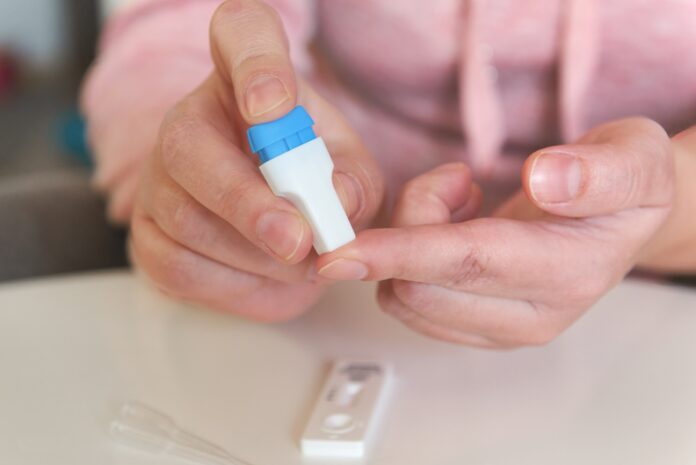Philly Keep on Loving is an online platform that initially launched as a media campaign to raise awareness about HIV testing and prevention. Now that resource has expanded.
“What we’ve tried to do is take it from just being an online website to a broad ecosystem that encompasses most of what people need to live a happy, healthy sexual life — and to keep themselves safe and protect themselves, no matter their HIV status,” said Javontae Lee Williams, MPH. He started working for the city’s Division of HIV Health (DHH) in 2019 to contribute to Philadelphia’s development of a citywide plan to end the HIV epidemic and is now the Prevention Program Manager.
Today, Keep on Loving is an interactive resource that includes up-to-date maps displaying clinics, a live chat with real representatives (not AI), information about HIV treatment and prevention, a 24/7 PEP hotline and instant access to medical providers, FAQs and guides, and self-scheduling features. More resources for people newly diagnosed as HIV+ are coming soon — including legal disclosures, “because there’s still parts of the country where HIV is criminalized, including Pennsylvania,” said Williams.
“We’re offering resources that go beyond just testing and biomedical prevention,” he underlined.
Users can even order condoms, lube, STI test kits, and other sexual health products from the site at no cost. The team is currently working on a tool that will help users find additional resources — like housing, food and other needs — and filter searches to make it easier for people to find medical care based on their insurance provider, neighborhood or other aspects of their identity and lived experiences.
“We now have telePrEP, which is completely virtual access to a pre-exposure prophylaxis program,” he added, explaining that increasing access to PrEP is crucial for ending the HIV crisis. To participate, all that’s needed is a Philadelphia mailing address. (For those who lack an address, Williams recommended Project Home, which also provides comprehensive HIV and STI testing and care.)
Other telemedicine providers specialize in making PrEP, PEP and HIV care available for people living in Pennsylvania and New Jersey as well as other states. This increases access to folks who don’t live directly in the city — but many of those options aren’t free. Philadelphia’s model of being a user-friendly, no-cost, one-stop shop for sexual wellness is unique.
Williams and his team wanted to implement the telePrEP program partially to reduce wait times for testing and medication. He explained it can take as long as six to eight weeks just to make an appointment with an in-person provider.
With telePrEP, patients can choose to receive all aspects of their care — from labs to medication — at home.
First, they’re assigned a navigator.
“The navigator’s role is to kind of carry them throughout the program — answering any questions, helping them find resources, making sure they hit all the steps they need to in order to get their prescriptions as soon as possible,” said Naomi Correa, MSW, LSW, who is the Philadelphia TelePrEP Program Supervisor at Einstein Healthcare Network.
One of those steps is completing lab work as close to the appointment as possible. That’s because the information gathered on those tests become less relevant if patients have continued sexual encounters or become exposed to HIV after their blood work is completed. Patients can choose an in-person testing site, like Labcorp or Quest, or they can use an at-home kit (which uses dried blood spot technology).
“Patients should not have any cost for their visit or for their medication,” said Correa. Grant-funded assistance can cover the cost of care — including for those who are billed by insurance (but patients are not required to be insured). If privacy is a concern, patients who have insurance can opt not to use it.
Most choose to get their medication in the mail, but they could opt to use a pharmacy of their choice — including their preferred mail-order pharmacy. Deliveries are typically received within a week — and the whole process can take as few as 12 days for some patients.
Part of DHH’s goal was to ensure at least 50% of people with PrEP indications are taking the medication — and that was a success in 2023. TelePrEP is supporting that effort with approximately 200 users during its first year.
“The experiences that have shaped my adulthood and the way I approach this work definitely come from my worldview of being a Black person with lower socio-economic status or less resources. I view access as highly important,” said Williams, who said he grew up poor and now aims to design programs that are “accurate, equitable, and considerate of the many different types of people and marginalization they experience.”
“As a Black, same gender loving man, HIV has impacted my community and has decimated a certain segment of the population,” said Williams, who just turned 39 and is grieving for the community’s lack of queer elders. He emphasized that this is a justice issue. Funding from the CDC for the telePrEP program will expire in July 2024, but DHH has strategies to keep the program in place.
“I do worry about the political climate turning against HIV prevention,” Williams added, underlining that it’s something to watch both nationally and at the local level.

